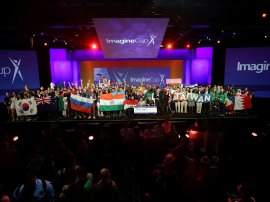Microsoft’s Imagine Cup UK 2015: People’s Choice winners revealed
Here are the student-designed tech projects you picked to reach the finals

The Microsoft Imagine Cup UK Finals 2015 takes place in a few short days – 31 March, to be precise – in London, and with the initial batch of finalists chosen, it was up to you dear readers to select the last teams to make the cut.
And what fine choices you’ve made. Here are the People’s Choice Winners for the 2015 competition, one each in the three categories, and the student creators are now on their way to try and impress the judges next week at the Finals.
If you voted, thanks so much for being a part of it. And if you didn’t, well at least you can still check out these last additions as they make their way to the final stage in a matter of days.
Don’t forget: you can attend Microsoft’s Imagine: Make it Happen event next Tuesday at Cardinal Place in London. Stuff editor-in-chief Will Findlater will be on hand in the morning session to take part in a discussion on startups and media with other tech luminaries, while the afternoon session will see the Imagine Cup finalists go head-to-head with their presentations. Be sure to sign up if you’re interested!
Gaming: Project Cyber
Team TerraBite was chosen out of the 13 remaining contenders for the Gaming competition, and the team is responsible for Project Cyber, a Kinect-driven puzzle game. Beyond the motion-controlled game itself, which finds you hacking in a stylized Cyberspace, Project Cyber also has a mobile companion app that plays a role.
World Citizenship: UNI
Having Technology Made Better is the student team behind UNI, or University Network Interface, a mobile app that will help new students become accustomed to university. It can direct them around campus and alert them to deadline, as well as help them pick out the most suitable societies to join.
Innovation: Movier
Movier is a mobile app that allows multiple users to record the same event – albeit from different locations and angles – and easily switch between angles during the shoot. The end result is a 30-60 second video that all creators have access to, which they can then customize with filters and other tweaks, and then share within the app or to outside networks.



